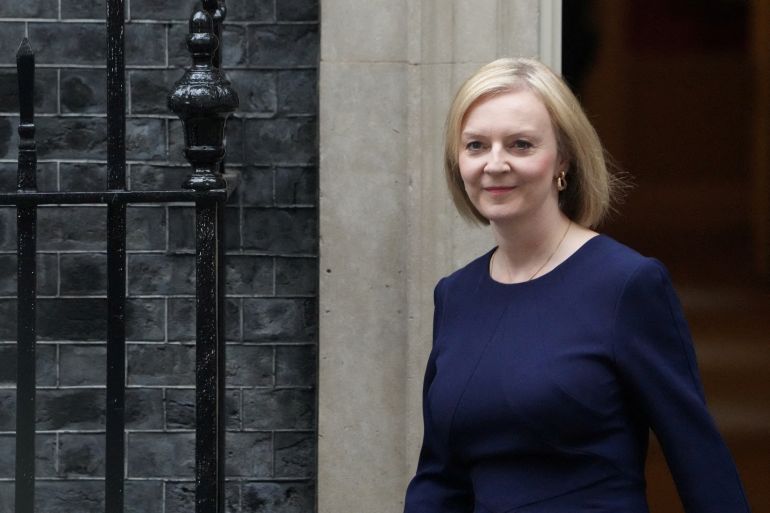PM Liz Truss defends uncosted UK tax cuts despite market turmoil
Truss says big tax cuts are the right path for the UK, refusing to consider reversing the so-called ‘mini budget’.

British Prime Minister Liz Truss has defended her economic plan and shrugged off the negative reaction from financial markets, saying she is willing to make “difficult decisions” to get the economy growing.
In her first public comments since the government’s announcement of billions in uncosted tax cuts roiled markets and drove the pound to record lows, Truss said on Thursday the United Kingdom was facing “very, very difficult economic times”.
Keep reading
list of 3 itemsIMF warns UK its budget cuts will ‘likely increase inequality’
UK announces most significant tax cuts since 1972
But she said the problems were global and spurred by Russia’s full-scale invasion of Ukraine.
Truss spoke after the Bank of England took emergency action on Wednesday to stabilise UK financial markets and head off a crisis in the broader economy after the government spooked investors with a programme of unfunded tax cuts, sending the pound tumbling and the cost of government debt soaring.
Truss told BBC local radio that “we had to take urgent action to get our economy growing, get Britain moving and also deal with inflation”.
“Of course lots of measures we have announced won’t happen overnight. We won’t see growth come through overnight,” she said. “What is important is that we are putting this country on a better trajectory for the long term.”
Taming inflation
In a series of interviews, Truss said her government’s decision to cap energy bills for households and businesses would help tame inflation and help millions of people facing a cost of living crisis.
But it was not that decision that alarmed the markets. It was the government’s announcement on Friday of an economic stimulus programme that included 45 billion pounds ($48bn) of tax cuts and no spending reductions – without an independent economic assessment of the cost and impact.
The Bank of England warned that crumbling confidence in the economy posed a “material risk to UK financial stability”, and said it would buy long-term government bonds over the next two weeks to combat a recent slide in British financial assets.
Mark Carney, the bank’s former governor, said the government and the central bank appeared to be pulling in different directions.
“Unfortunately having a partial budget, in these circumstances – tough global economy, tough financial market position, working at cross-purposes with the bank – has led to quite dramatic moves in financial markets,” he told the BBC.
The pound traded at about $1.08 on Thursday, above its record low of $1.0373 on Monday. It has lost about 4 percent of its value since Friday.
Truss became prime minister on September 6 after winning the leadership of the governing Conservative Party with promises to cut taxes.
Stretched finances
Investors, businesses and consumers are now waiting for the government to announce more details of how it plans to get the economy growing more quickly, which will be key to fixing the UK’s increasingly stretched public finances.
“Every day, every week, every month, the government will now be critiqued by markets and businesses on how serious they are about growth and about their fiscal responsibility to pay back debt,” Tony Danker, director general of the Confederation of British Industry, said on Wednesday evening.
Deputy finance minister Chris Philp said the government would stick to its plan to hold a fuller fiscal announcement on November 23, when it will set out further details on how it will cut debt.
Some financial analysts have said the government might have to bring forward that announcement to settle the nerves of investors.